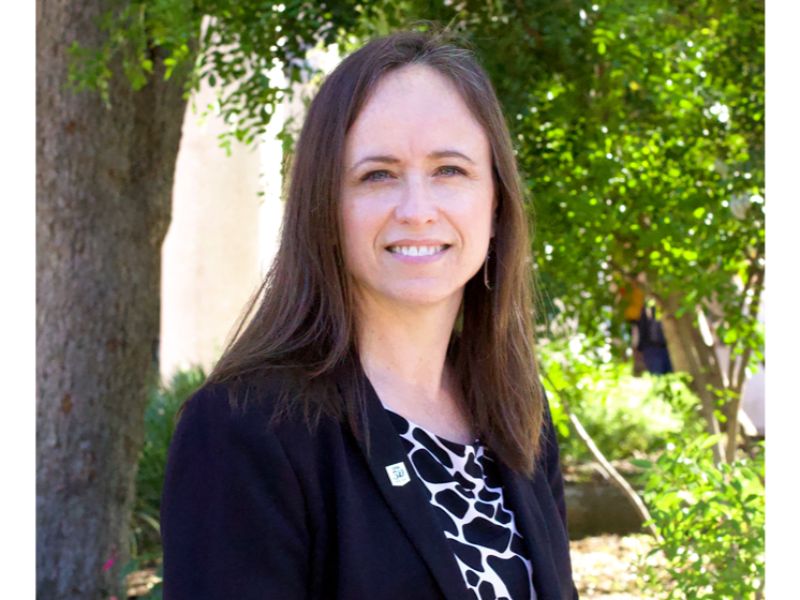Posted on November 14, 2021 by Amanda Cerreto
November 15, 2021 - Professor Sandra B. Morissette has been elected as a Fellow to the American Psychological Association (APA), Division 56 (Trauma Psychology) . This national recognition is awarded on the basis of outstanding contributions in the field of psychology that have had a national impact.
 Morissette has dedicated her career to researching and understanding trauma psychology, particularly in the context of veteran support. As a professor and Chair of the Department of Psychology in UTSA's
College for Health, Community and Policy
, her research has focused on understanding factors that influence risk, resilience, and functional recovery following warzone deployments.
Morissette has dedicated her career to researching and understanding trauma psychology, particularly in the context of veteran support. As a professor and Chair of the Department of Psychology in UTSA's
College for Health, Community and Policy
, her research has focused on understanding factors that influence risk, resilience, and functional recovery following warzone deployments.
"It is an honor and privilege to be elected to Fellow status of APA's Division 56, not only to be recognized by APA, but especially because it is a recognition from my peers who are Fellows within the division and share a common passion to advance the field of trauma."
Since completing her doctoral degree in clinical psychology, Morissette has conducted important research related to trauma, anxiety disorders, and other commonly co-occurring conditions. She has received funding from VA, the Department of Defense, and National Institute of Health, and published over 100 scientific articles.
"I am personally proud of Dr. Morissette for having been named an APA Trauma Psychology Fellow as it is a quite prestigious recognition," said Dean Lynne Cossman. “We - as a College - are also proud to have her and her expertise on trauma psychology, particularly associated with veterans' experiences, at UTSA and in Military City, USA.”
During nearly two decades working for the Department of Veterans Affairs (VA), Morissette developed and directed the first cognitive-behavioral anxiety disorders clinic at VA Boston Healthcare System (VABHS), established a new Primary Care Behavioral Health program (PCBH) at VABHS, and contributed to the development of a congressionally-mandated research center for returning post-9/11 veterans in Waco, Texas.
“Notably, Texas has a vast shortage of clinical psychologists, and Waco is an area of particularly high need, neighboring Fort Hood, the third largest military base in the world,” Morissette said. In Waco, among other accomplishments, she established and led a 10-year, VA-funded longitudinal program of research, Project SERVE (Study Evaluating Returning Veterans' Experiences).
Project SERVE is a network of studies designed to independently and collectively contribute to a better understanding of risk, resilience, and functional recovery processes in post-9/11 veterans and their families following warzone deployments. Although Morissette left the VA in 2015, she continues to actively collaborate and lead projects related to this research at UTSA.
“I couldn't have accomplished what I have without an outstanding team of SERVE investigators from around the country,” Morissette said. “We are particularly interested in understanding PTSD risk and resilience within the larger context of co-occurring conditions (e.g., depression, alcohol/substance use disorders, TBI, pain, sleep, suicide, non-suicidal self-injury). Our overarching aim is to develop translational clinical treatment programs using empirically-supported predictors of risk and resilience for PTSD, co-occurring conditions, and functional recovery.”
“Although most veterans are resilient and will never develop mental health conditions, risk for PTSD is elevated in the context of their higher trauma exposure. We must continue to build a workforce of researchers and clinicians to more fully understand and treat the complexities of PTSD and co-occurring conditions, and promote functional recovery.”
Morissette received her doctoral degree in clinical psychology in 2001 from Boston University. Her work has contributed in part to a shift in the field to considering complex co-occurring conditions, particularly anxiety/traumatic stress disorders and addictive behaviors. Moreover, her research has contributed to increased attention on understanding long-term functional recovery processes among returning veterans.
“This work is far from done,” Morissette said. “Although most veterans are resilient and will never develop mental health conditions, risk for PTSD is elevated in the context of their higher trauma exposure. We must continue to build a workforce of researchers and clinicians to more fully understand and treat the complexities of PTSD and co-occurring conditions, and promote functional recovery.”
In order to be selected as a Fellow for the APA, candidates must show unusual and outstanding contribution or performance in their field and demonstrate national impact. Morissette certainly fits the bill.
“I am passionate about conducting research that can help us better understand how to help veterans and improve VA healthcare,” Morissette said. “To me, it is a way to give back, to serve them, for all they have done in service to our country.”

